Every year around the world, workers in most countries celebrate Labour Day on May 1, a notable exception being the US which celebrates it in September.
It has its roots in the International Workers Day celebrations called by socialists and unionists in the late 19th century and Malaysian workers are naturally part of this larger family.
This year’s Labour Day is part of a long extended break as it also falls near the religious holiday of Hari Raya Aidilfitri at the end of the Muslim fasting month. As such, celebrations can be expected to be relatively muted.
For one man, PSM deputy chairperson S Arulchelvan, it is nonetheless a day he will always celebrate – indeed, he has not missed a celebration for nearly 30 years.
“It means a lot to me and PSM. PSM was actually founded because of May Day in 1994 because it was the first time that the Community Development Centre in Kajang led by me, Alaigal (led by Dr Michael Jeyakumar Devaraj and M Sarasvathy), and Suara Warga Pertiwi (led by Dr Nasir Nashim and V Selvam), came together.
“We came together to organise the biggest May Day event at Dataran Merdeka in 20 years as well as the biggest gathering since Operasi Lalang in 1987.
“Urban settlers and plantation workers participated in the rally. It was even recognised as an awakening of Malaysian workers because, for many years, May Day was not organised publicly,” Arulchelvan said.
“As for me, I was the coordinator of that May Day 1994 and since then I have been one of the main organisers of every May Day in which I have been arrested a few times and questioned a dozen times more for being a May Day organiser,” he added.
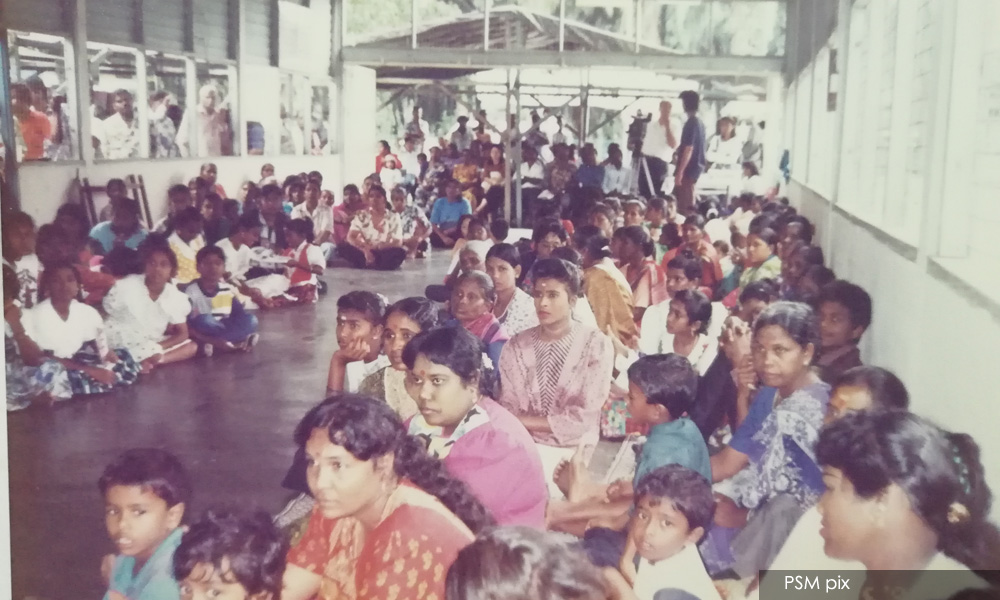

It was also on the eve of May Day in 1998 (April 30, 1998) that his party made an application to be registered as PSM.
“We did this since the Registrar of Societies was closed on May 1 as it’s a public holiday, so PSM celebrates April 30 as our birth date.
“I also wrote a book on 10 years of May Day celebrations called ‘Sambutan Hari Buruh di Malaysia – Merenung kembali sejarah sepuluh tahun (1994-2003)’ (Labour Day Celebrations in Malaysia - Remembering a decade of history 1994-2003).
“Currently, I am working on an updated version of the book to cover May Day till 2023 which will be a compilation of 30 years of history,” Arulchelvan said.
He shared that Labour Day carried a lot of personal meaning for him and his party.
“Emotionally, many workers have died here and around the world to fight for workers’ rights. Today, rightfully, May Day is one of the five compulsory leave days under Malaysian labour law,” he added.
Socialist history
Malaysia’s socialist history seems to have been lost in the wind. A mention of “Reds” and many will talk with passion about distant football teams like Liverpool and Manchester United while being unaware of the significance of the Socialist Front, PSRM, and key labour leaders.
Arulchelvan believes that the left-wing played a key role in the independence of Malaya that needs to be acknowledged, including the Communist Party of Malaya.
“The Socialist Front including young people like Karam Singh from Parti Rakyat and V David from the Labour Party also played a key role in making May Day a holiday. And many prominent May Day organisers have been previously arrested under the Emergency law and Internal Security Act (ISA) for organising May Day.

“The biggest May Day rally to date was in Singapore 1947 (then still part of Malaya) where the Pan-Malayan Federation of Trade Unions and the Singapore Federation of Trade Unions organised one by 50,000 workers in Farrer Park.
“Meanwhile the biggest May Day rally in modern Malaysia was organised in 2014 with 30,000 people at Dataran Merdeka to oppose the goods and services tax (GST). I am proud that police permission was given under my name,” he said.
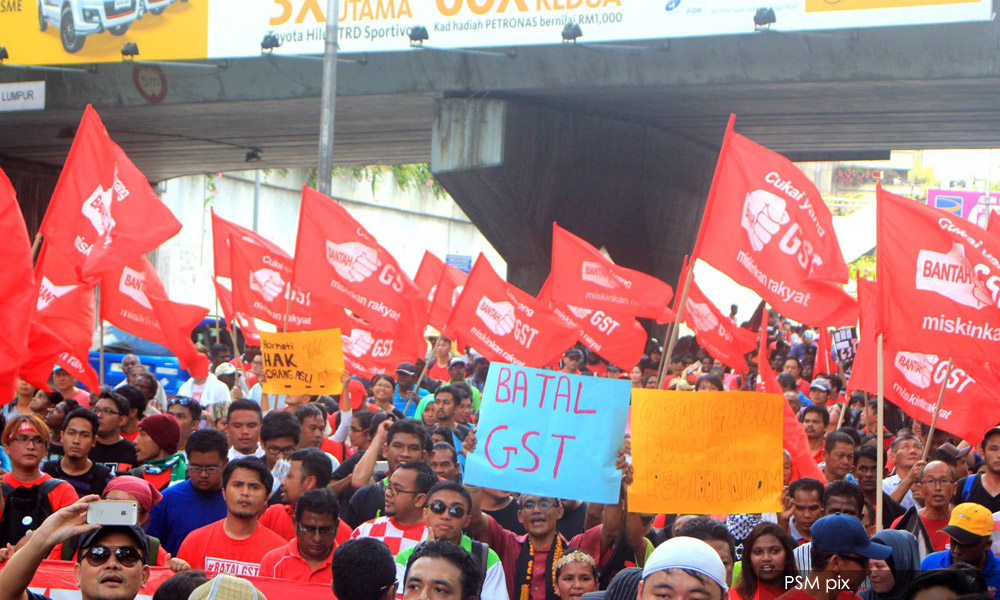
Love-hate relationship with MTUC
One of the hallmarks of a traditional socialist party is that it has close ties with the labour movement but that seems to be lacking with the umbrella union body, the Malaysian Trades Union Congress (MTUC).
“The Trade Union Act has been suppressed by not allowing union leaders to join political parties since the 1969 emergency ordinance. So many unions tend to be apolitical.
“PSM does have a love-hate relationship with the MTUC depending on who is at the helm of it. Some MTUC leaders are quite open to our involvement but others see us as a rival.
“It is also interesting that the Human Resources Ministry from the time of BN, Pakatan Harapan, and even now does invite PSM to engage on labour issues,” Arulchelvan said.
This is as they know that PSM has been very involved in workers’ issues and is “the undisputed party championing the voices of workers,” he added.
He said PSM and its front organisation in recent years have been involved with organising the National Union of Workers in Hospital Support and Allied Services (NUWHSAS) which is one of the bolder unions.
“We have done lots of work with school cleaners and security guards. We also, through our front organisation, network with around 30 unions and have formed many worksite workers’ committees,” the PSM man added.
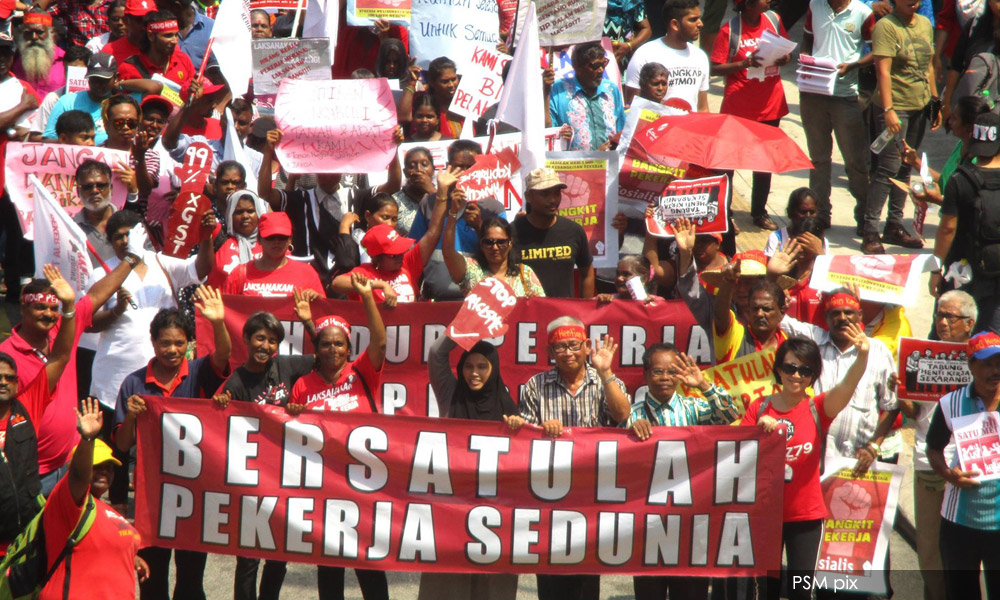
Persisting key issues
Arulchelvan said despite the recognition of Labour Day and the existence of MTUC, PSM, and the like, there are many key issues that persist for Malaysian workers today:
1. Union bashing
From 1945 till 1948, 67 percent or two-thirds of workers were unionised. Today, the figure is less than six percent.
Unions have been systematically destroyed because of anti-union laws. The influx of migrant labour has reduced the bargaining power of local unions because of the number of workers available.
Neoliberal capitalism has made work so irregular and flexible that it is hard to build workers’ power through unions as before.
2. Gig workers
Informal and gig workers are becoming the new workforce, yet many of their rights are being suppressed and they do not have laws to protect them.
This will be the new challenge in organising workers in a sector which is so temporary and irregular.
3. Contract system
Lots of workers in all sectors are becoming irregular and short term contract workers. This means their right to work is not guaranteed which is a fundamental human right.
The contract system has become rampant and has made workers feel insecure.
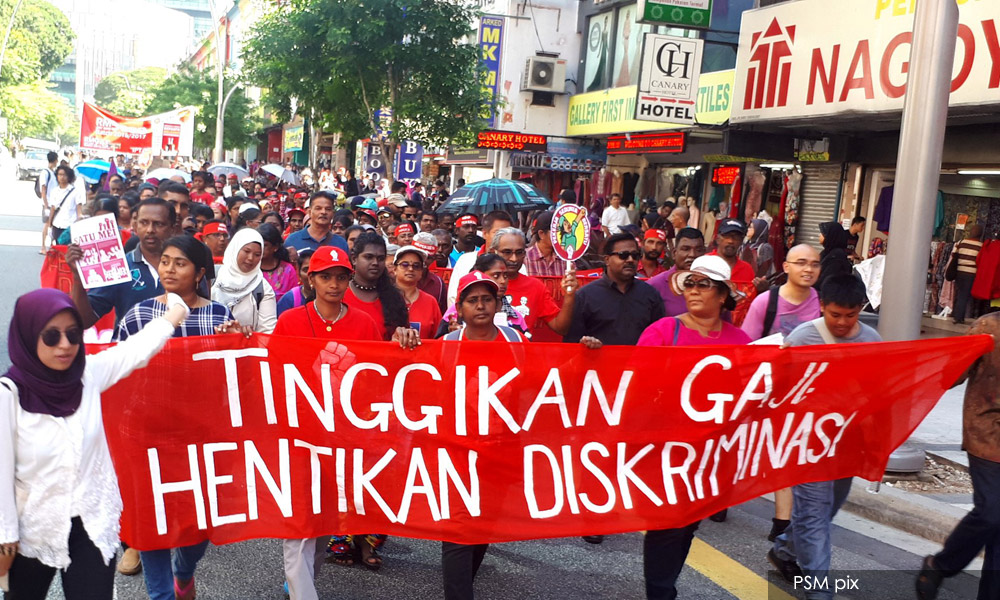
4. Exploitation of migrants and refugees
Refugees are not allowed to work while most migrants are employed illegally in sectors they are not supposed to work in which makes them vulnerable.
They are the most exploited. Their passports are held by employers and they are very much bonded labour in a new setup. Right-wing political parties abuse them verbally but employ them happily to get cheap labour.
5. Suppression of social security and wages
Workers’ retirement benefits in the Employees Provident Fund (EPF) have been ripped apart. It seems because of the global economy and competition for investment, there is a race to the bottom so governments try to reduce the rights and benefits of workers to attract investment.
Workers’ rights are being compromised in the name of profit. We need to fight hard to save Socso and EPF for the future.
Not getting through to voters
Despite a record of integrity and the sterling performance of PSM chairperson Jeyakumar in two terms as the Sungai Siput MP, PSM was soundly thumped in the 14th general election.
The Johor state election showed that while the Harapan coalition is losing voters and falling further behind a resurgent BN, the masses are not turning to PSM at the ballot box.
Arulchelvan feels PSM will have to find a way to overcome the dynamic to ensure its message gets through.
“Malaysian politics is all about coalition politics. No single party in our history has come to power without a coalition. If you are not part of a coalition, you tend to lose deposits which can be seen in the fate of PSM as well as Pejuang, Warisan, etc in the Johor polls.
“Muda on the other hand did well because it is part of a coalition.
“Therefore, unless PSM becomes part of one or builds a left-wing coalition with Parti Rakyat Malaysia (PRM) and other parties, we must ask if we can be a real alternative for the public,” he said.
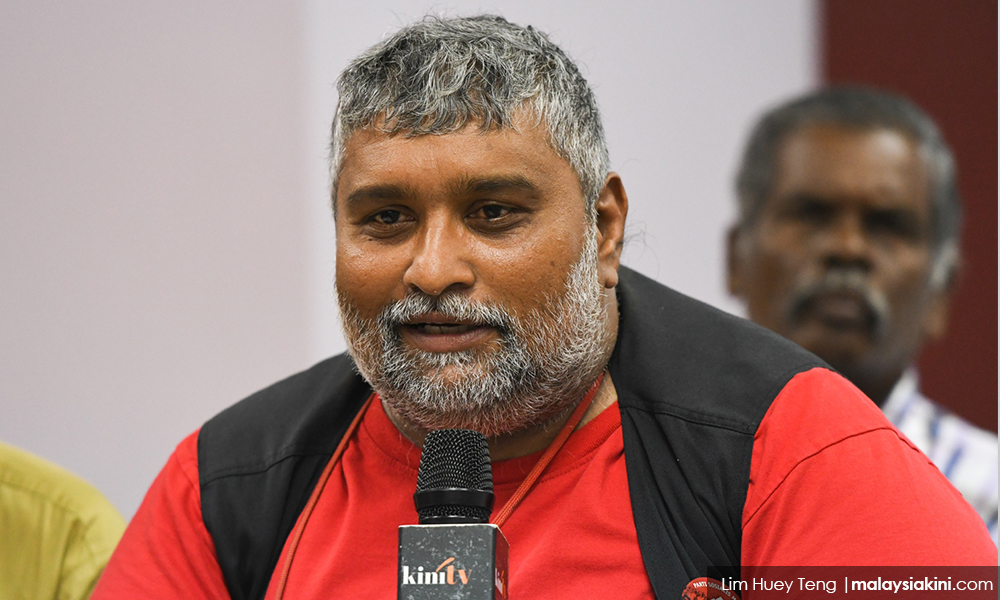
Arulchelvan admitted that the collective action of all left-wing forces in the country is not enough to contest that many seats, let alone to win some.
“Only this year, PRM in its AGM decided to work with PSM. In the meanwhile, PSM will have to work with progressive forces in all parties including Muda, Harapan, and other parties to ensure electoral victory. This is something we need to explore.
“Racial politics still overshadows class politics and that would be yet one of the biggest stumbling blocks. Meanwhile, the First-past-the-post (FPTP) system benefits only big parties,” he said.
Political insiders previously pinpointed former Selangor menteri besar Azmin Ali as among the biggest obstacles to PSM working with Harapan, but noticeably, after his defection, there is still no closer cooperation between the two.
“Azmin is just a name thrown about as a fall guy but honestly, Harapan at times sees PSM as an adversary rather than a friend because of our position on neoliberal capitalism and taxation policies – they seem to have a problem with that.
“At the end of the day, while they talk about the big tent, the tent is not transparent. What it means and what it stands for is open to interpretation. Decisions are not centred on policies but rather on real politics which in Malaysian vocabulary means racial politics.
“PSM is not ready to compromise on key principles but very ready to work on a minimum programme with other parties. Over the years, in spite of electoral defeats, our party membership and influence have grown slowly but surely,” he said.
Racially skewed labour
The traditional labour force in many sectors such as rubber estates was centred around ethnic Indians and hence both the MTUC leadership and parties like PSM have been disproportionately represented by that community.
Arulchelvan acknowledges the issue but believes that times are changing.
“When PSM started, we were 80 percent Indian-based, but today, most young members joining the party are Malays. This is looking at the statistics in the last four years. Non-Indian participation is now much higher and a bit more than 50 percent.
“Besides that, looking at the organising work done by PSM and its front organisation over the years, we have moved from the plantation sector to other sectors which are more multi-racial like the contract workers, gig economy, farmers, settlers, and our target groups are very multiracial.
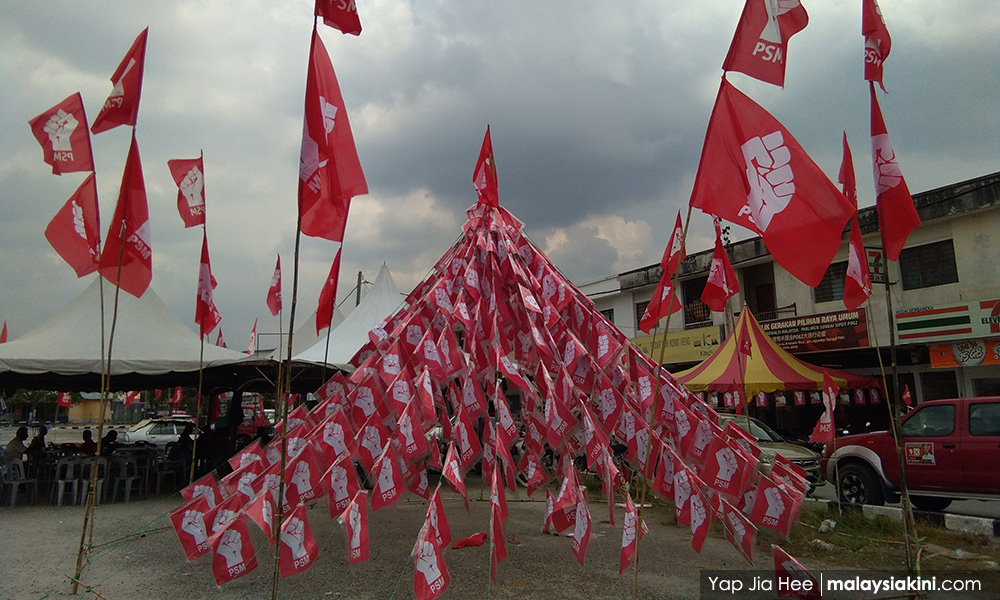
“PSM’s main focus on health care, housing rights, and climate issues has also cut across racial stereotypes.”
Personally, no regrets
Despite a lifetime in what seems to be an uphill struggle, Arulchelvan has no regrets and does not believe in abandoning the workers’ cause.
“There is no regret. Living a simple life is less stressful than living a consumer’s materialist life.
“Our struggle has seen the minimum wage law, workers insurance scheme, and we have built grassroots power in many communities and victories in many places.
“We are the pioneer in many struggles and I am happy to be in a party where we get respect for the work we do,” he said.
“While Harapan and BN can rule the Parliament, the power in the streets and grassroots movement is definitely dominated by us and many other collectives and marhaen (people’s) movement where we spend a lot of time building this power from below.
“As Karl Marx says ‘we have nothing to lose but our chains’,” he added.
Arulchelvan shared that when he first participated in forming PSM, there was a fear that the Malays would not want to join the party and that Nasir will be the ‘melayu terakhir’ (last Malay). However, that is no longer a concern.
“I was afraid that socialism will never surface because we were formed after the collapse of the eastern block, but today socialism is alive and still kicking; we have a young vibrant membership and are not living in nostalgia.”
He said that PSM and the workers’ movement are on a long and difficult route but it is one which is empowering and builds society from the ground up.
“The mainstream media always gives us coverage because they feel we have something different to offer.
“The struggle is not easy. If you dare to fight, you can win. If you don’t fight, then you are fated to lose.” - Mkini


No comments:
Post a Comment
Note: Only a member of this blog may post a comment.